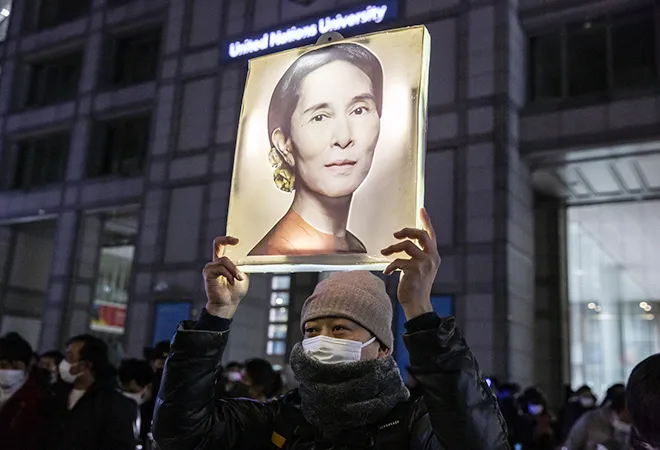-
CENTRES
Progammes & Centres
Location
The world frets as Aung San Suu Kyi is tried on multiple grounds. Has the tombstone of Myanmar democracy been laid?

The recent move by the military court to imprison the ex-State Counsellor for two years is considered to be a major “blow to democracy” but in tandem with Junta’s wish to eliminate the leaders of the powerful opposition party before the so-called ‘multi-party election’ in 2023.
Daw Aung San Suu Kyi, who was detained after the coup in February, is currently facing 11 charges including corruption, violating COVID-19 pandemic restrictions during the 2020 election campaign, incitement, illegally importing goods, and violation of the colonial-era Official Secrets Act. The maximum imprisonment, if found guilty on all accounts, is more than 100 years. The charges for which she was recently tried were on two accounts first, of inciting the public against the military, and second, breaching the COVID-19 protocols in the country.
As the initial imprisonment was lessened from four to two years, Aung San Suu Kyi will be credited with 10 months for time already served in detention since February on the incitement case, leaving her with one year and two months to serve on that charge. There was no similar reduction on the charge of violating the coronavirus restrictions.
On 17 December, she appeared in court wearing a prison uniform to face corruption charges in which the junta accused her of procuring rental properties below the market rate.
It’s not new for Aung San Suu Kyi to be imprisoned by the military on false and unjust grounds. She has already spent 15 years under house arrest. Unfortunately, in a month, the coup will complete its first year. It can be seen that the caretaker government has speedily donned the character of the authoritarian dictator throwing the country to the exact similar state it was a decade back. There is a need to analyse and understand what led to the coup and the current happenings due to the said verdict.
Since 2011, the military rulers changed some of their policies to accommodate the NLD party that helped bring about the much-required democratic transformation. A combination of three factors, i.e., international pressure as well as demonstration by the citizens, and most significantly, the political willingness of the Junta played a key role to implement such alterations. It remains a fact that the military leaders understood the pulse of the people and that they needed to avoid any sudden popular uprising such as the 8888 or 2007 Saffron Revolution. It is believed that the military government wanted to be recognised in a better light on the national and international stage. Thus, armed with the 2008 Constitution that ensured important powers will remain with the Junta, they went ahead with the changes.
It can be seen that the caretaker government has speedily donned the character of the authoritarian dictator throwing the country to the exact similar state it was a decade back.
The five years of NLD rule saw slight changes being implemented by the new government in terms of economic and constitutional reforms or federalism that the former had promised. The period did witness a pragmatic relationship between the Junta and the civilian government, where the world saw the latter shielding Junta’s atrocities over the ethnic minorities, especially the Rohingyas.
The 2020 elections became the prime point of contest between the two. While COVID protocols, prevention, and restrictions became the campaigning points, the declining image of the Union Solidarity and Development Party (USDP) into electoral irrelevance came as a jolt to the military rulers once the election results were announced. The landslide victory and sheer popularity of the NLD government in 2020 condensed the influence of the military over the legislative branch of government. This enhanced the likelihood of further reforms to the Constitution that will eventually erode the influence of the military from the government. This would have in turn fortified the NLD’s position since it would have an electoral command to govern on its terms. The Junta could not let this happen and this was perhaps one of the major reasons that resulted in the allegation of electoral fraud and the subsequent coup.
The current verdict has given the nationwide movement a new purpose to fight on. The youth are fearlessly driving ahead. Around 1,400 people have been killed for protesting the junta’s actions till now, villages have been burnt to ashes. The National Unity Government party mostly comprised of the ex-leaders of the NLD party has recently approached the Arakan National League to jointly overthrow the Junta. Such instances will increase in the future.
The current sentencing brings about international disapproval, where statements have been flooding the internet and news channels displaying two diverse reactions. One is condemning the act and openly stating this measure is politically motivated and the second is of deep concern. Spokesperson of the European Union (EU), United Nations (UN), United States (US), and Security Council have openly condemned the act. The EU's diplomat Josep Borrell called the verdict “politically motivated”. UN Chief Michelle Bachelet said that the court that convicted Suu Kyi had conducted a "sham trial". The Security Council released a statement condemning the verdicts and calling for a democratic transition in Myanmar and the release of political prisoners. The United States is planning to bring about new sanctions to force the current leaders to change their course of action.
The neighbouring nations have yet again taken a constructive tone and have given statements that are mostly of concern and not overly critical. For instance, Yoshimasa Hayashi, Japanese Foreign Minister stated that Tokyo is deeply concerned over the current verdict. Indian External Affairs Ministry spokesperson Arindam Bagchi has expressed deep concern and has said New Delhi is disturbed over the recent events. Both nations have emphasised the need for the democratic process to be upheld.
As chair of ASEAN for 2022, Cambodia’s approach to Myanmar will set the tone for the bloc’s efforts to address the issues within the nation for the next two years.
Chinese Foreign Ministry spokesperson Zhao Lijian states Beijing hopes "all parties in Myanmar will bear in mind the long-term interests of the country, narrow differences and carry on the hard-won democratic transition process.”
Charles Santiago, the chair of the regional bloc ASEAN Parliamentarians for Human Rights, called the sentencing “a travesty of justice” that establishes the Junta’s reservation to adhere to the regional bloc’s decisions and steps. On a different note, the Cambodian Prime Minister, the current chair of ASEAN is scheduled to visit the nation next month to open channels of communication. As chair of ASEAN for 2022, Cambodia’s approach to Myanmar will set the tone for the bloc’s efforts to address the issues within the nation for the next two years. Though facing tremendous criticism over this step as it may mean legitimising military rulers as authorities in the eyes of ASEAN, such visits are required for dialogues to open and flow. Scope for further dialogues will remain essential if true changes are desired. There is a need to understand that while some numbers of sanctions are necessary, they have little chance of bringing about the anticipated effect.
Shutting away the Junta will have limited benefits if one considers the welfare of the nation and the region as a whole vital. The political willingness of the Junta has and will remain crucial for constructive changes to ensue. While more verdicts are awaited and feared, the democratic nations need to keep Myanmar at the helm of their foreign policy.
The views expressed above belong to the author(s). ORF research and analyses now available on Telegram! Click here to access our curated content — blogs, longforms and interviews.

Sreeparna Banerjee is an Associate Fellow in the Strategic Studies Programme. Her work focuses on the geopolitical and strategic affairs concerning two Southeast Asian countries, namely ...
Read More +